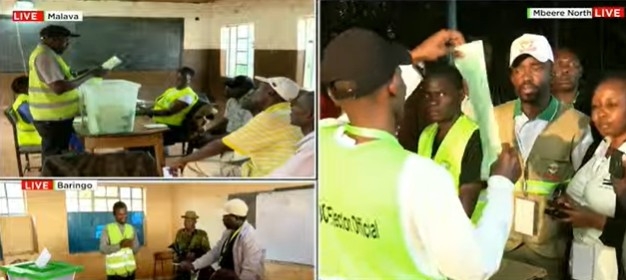President William Ruto last week announced that the government shall implement the Warehouse Receipt System Act, 2019.
The Act establishes a structured and well-regulated trading system for agricultural commodities.
Ruto said the WRS eliminates brokers, middlemen, conmen and other intermediaries, as well as other perennial marketing challenges related to cereals and pulses.
“This system creates an ecosystem with opportunities for the private sector and NCPB to provide a trading platform that links buyers and sellers, and facilitates access to credit by agricultural producers," Ruto said.
"The Warehouse Receipt System also supports the reduction of post-harvest losses and cushions farmers against low farm-gate prices.”
The Warehouse Receipt System seeks to bring sanity to the maize subsector which was marred with corruption and exploitation of farmers by unscrupulous traders who often dictated the market prices.
In June 2019, Parliament passed the Warehouse Receipts Systems Act, thereby setting out a legal framework for the development and governing of a Warehouse Receipt System for the Country registering private warehouse operators.
Agriculture Principal Secretary Kello Harsama explained that in the WRS, farmers/producers deposit their produce in a certified warehouse and are issued with a receipt as proof of ownership.
The receipt can be used as collateral to access a loan from the bank.
He said farmers can utilise the warehouses to store their long rains harvest to reduce post-harvest losses which he said is a big challenge affecting maize production.
“When farmers harvest their produce, instead of rushing to the market which drives the prices down, they have places or warehouses where they can deposit their produce," the PS said.
"In exchange, they get a receipt which is a legal tender and they are able to sell their produce when the price is right by just selling the receipts.”
Harsama added that this will help remove the desperation from farmers because most of the time they don’t have anywhere to store their maize if they harvest a lot.
“The WRS serves two purposes, one, farmers are able to sell their produce when the price is right and earn more, and at the same time, farmers are able to reduce post-harvest losses, which are responsible for 30 per cent of the losses that they face,” he said.
Kipkorir Menjo, Kenya Farmers Association director said the warehouse is a good concept but it needs to be domesticated to accommodate small-scale farmers.
He said most farmers do not have the luxury to store their produce until when prices are good because they have pressing financial needs and they cannot store their maize and wait until when the prices are better.
“The WRS is meant to stabilise maize prices but many small-scale farmers want to dispose of it within the shortest time possible at the available prices. This is in order to meet their immediate financial needs,” Menjo said.
The Warehouse Receipt System Act then established the Warehouse Receipt System Council which was inaugurated by the CS on July 29, 2020.
The Council was mandated to oversee the establishment, maintenance, and development of the WRS for agricultural commodities produced in the country in collaboration with County Governments and other players in the value chain.
Jane Ngige, chairperson of the WRS Council said the council is mandated to ensure the efficiency, effectiveness, and integrity of the system.
It is also mandated to provide for the registration, licencing and inspection of warehouses and warehouse operators.
The Council comprises multi-sectoral representatives from the major agricultural commodities trade network in the public and private sectors.
A total of 58 National Cereals and Produce Board Warehouses have been identified as suitable for WRS.
She said the Council is aware of inaccurate information in the public domain that is causing anxiety among stakeholders, especially farmers.
Ngige said the Warehouse Receipt Council has so far certified six warehouses across the country.
Lucy Komen who is in charge of Investment, Promotion and Partnership at the Warehouse Receipt Council said the licensed warehouses are in the grain basket counties of Uasin Gishu, Trans Noza and Meru.
“There are two in Uasin Gishu and one in Nakuru, Meru, Trans Nzoia and Nairobi,” she said.
















